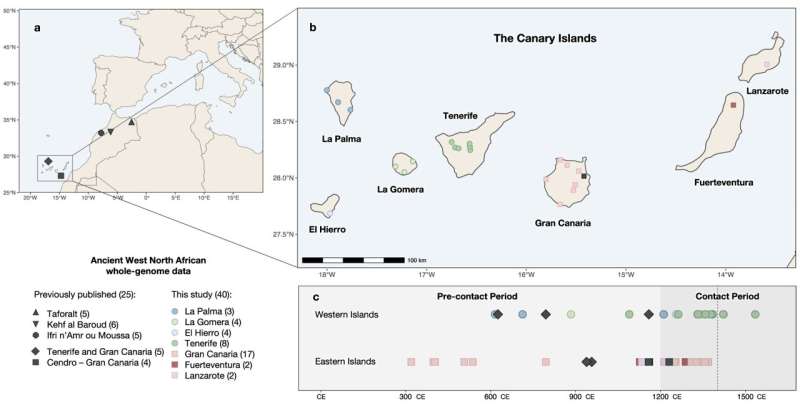August 16, 2023 report
This article has been reviewed according to Science X's editorial process and policies. Editors have highlighted the following attributes while ensuring the content's credibility:
fact-checked
peer-reviewed publication
trusted source
proofread
Genetic study of 3rd- to 16th-century people living on Canary Islands provide North African history clues

A team of paleo-geneticists at Universidad de La Laguna on Santa Cruz de Tenerife, working with colleagues from other Canary Islands and European institutes, has found that studying the genes of people living in the Canary Islands from the 3rd to the 16th century sheds light on the history of people living in North Africa around the same time.
In their study, reported in the journal Nature Communications, the group obtained bone samples from other research efforts and conducted genetic studies.
As archaeologists, historians and other researchers attempt to piece together the details of human history, going back as far as possible, they sometimes encounter blank spaces in the record. That has been the case with many parts of North Africa over the centuries from approximately the 200s to the 1500s. This is due, the researchers note, to the hot and dry climate.
The bones of those who lived there during that time have not been preserved well enough to extract DNA. To fill in some of the blanks, the team on this new effort looked instead at the bones of people living on the Canary Islands during that time. Prior research has shown that the people living in the Canary Islands during this period came from North Africa.
The work involved sequencing samples collected from bones and teeth unearthed on the islands during past digs by other research teams. They focused their attention only on bones and teeth of people known to have lived on at least one of the Canary Islands during the 3rd to 16th centuries.
The team found genetic ties between people living on the islands and those living in North Africa, mainly in what is now Morocco, dating back 5,000 years. They also found evidence of genetic influences from people living along the Mediterranean Sea, both in Africa and Europe—likely due, the researchers note, to migration across the Sahara.
The research team also found differences in the genes of people based on location—islands closer to Africa experienced more ancestral influence from European people, while those farther away were more African.
More information: Javier G. Serrano et al, The genomic history of the indigenous people of the Canary Islands, Nature Communications (2023). DOI: 10.1038/s41467-023-40198-w
Journal information: Nature Communications
© 2023 Science X Network




















